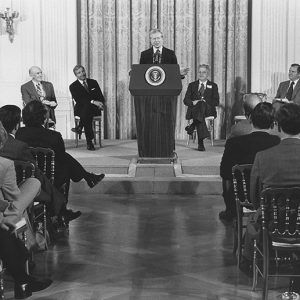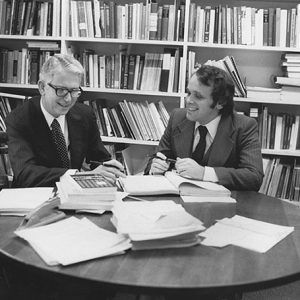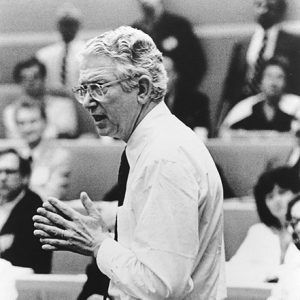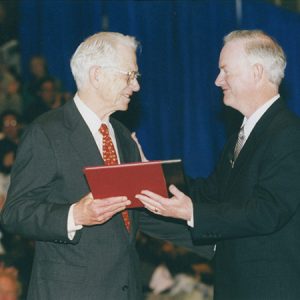calsfoundation@cals.org
Robert Blair Stobaugh (1927–2017)
Robert Blair Stobaugh was an authority on energy, international business, and corporate governance who served as a professor in the Harvard Business School. His 1979 book Energy Future: The Report of the Energy Project led to significant initiatives in energy policy by the Carter administration and became a New York Times bestseller. His article “The Bent Measuring Stick of the Multinational Enterprise” was voted one of the twenty best articles ever published on international business. A federal judge once referred to him as “one of the nation’s foremost experts on corporate governance,” and was quoted on the front page of the Wall Street Journal several times.
Robert Stobaugh was born on October 15, 1927, in McGehee (Desha County) to Robert B. Stobaugh and Helen Parris Stobaugh, who owned and operated City Laundry. He had an older half-brother and a younger brother. His mother, indulging her love of travel, took young Stobaugh out of school for long driving trips. He started school at age four, skipped a grade, and enrolled at Louisiana State University (LSU) at age fifteen.
Stobaugh graduated from LSU in 1947 with a degree in chemical engineering; he was made a member of the LSU Hall of Distinction. He began work as a trainee at Standard Oil’s Baton Rouge, Louisiana, refinery, which he later called the “Harvard Business School of Refining.” He married Beverly Parker of Baton Rouge later that year. They had four children; she died in 1990. He married June Gray in 1991.
He worked for Standard Oil, Creole Petroleum, Caltex Oil, and Monsanto, with assignments in Venezuela; Bahrain; London, England; and Houston, Texas. Publication of a series of papers on the pricing of chemicals helped whet his interest in an academic career, and he resigned from Monsanto in 1965 and enrolled in the Harvard Business School, from which he received a PhD in 1968. He subsequently joined the faculty. There, he headed a research team that identified a positive effect of American overseas investment on the U.S. economy. In an appearance before a congressional committee, he testified against proposed legislation to restrict such investment.
Stobaugh organized the Energy Project, a Harvard University group that began its study in 1972, before the Arab oil embargo. It concluded that the United States should move from unrestricted reliance on foreign oil to a variety of energy resources—a recommendation with far-reaching implications. Stobaugh was an advisor to the administrations of Lyndon Johnson, Richard Nixon, and Jimmy Carter; he also served as a director on eleven corporate boards and taught corporate governance at Rice University. As a director of the National Association of Corporate Directors, he put forward recommendations to protect shareholder interests.
Stobaugh was named Charles Edward Wilson Professor of Business Administration at Harvard in 1983. After his retirement from Harvard, he moved to Houston, where he taught at Rice for four years. He published the first volume of his memoirs, Starting from Arkansas: Four Continents, Four Companies, Four Kids, in 2012. He died on August 14, 2017, in Houston.
For additional information:
“Robert B. Stobaugh.” Academy of International Business. http://aib.msu.edu/fellow/53/Robert-B-Stobaugh%E2%80%8E (accessed November 26, 2025).
Stobaugh, Robert B. Starting from Arkansas: Four Continents, Four Countries, Four Kids. N.p.: Robert B. Stobaugh, 2012.
Stobaugh, Robert B., and Daniel Yergin, eds. Energy Future: Report of the Energy Project at the Harvard Business School. New York: Random House, 1979.
Stobaugh, Robert B., Alan McGettigan, and Robert Sigler. “Board Evaluation: A Key to Strategic Planning.” Director’s Monthly (July 1999): 1–4.
Taylor Prewitt
Fort Smith, Arkansas











Comments
No comments on this entry yet.